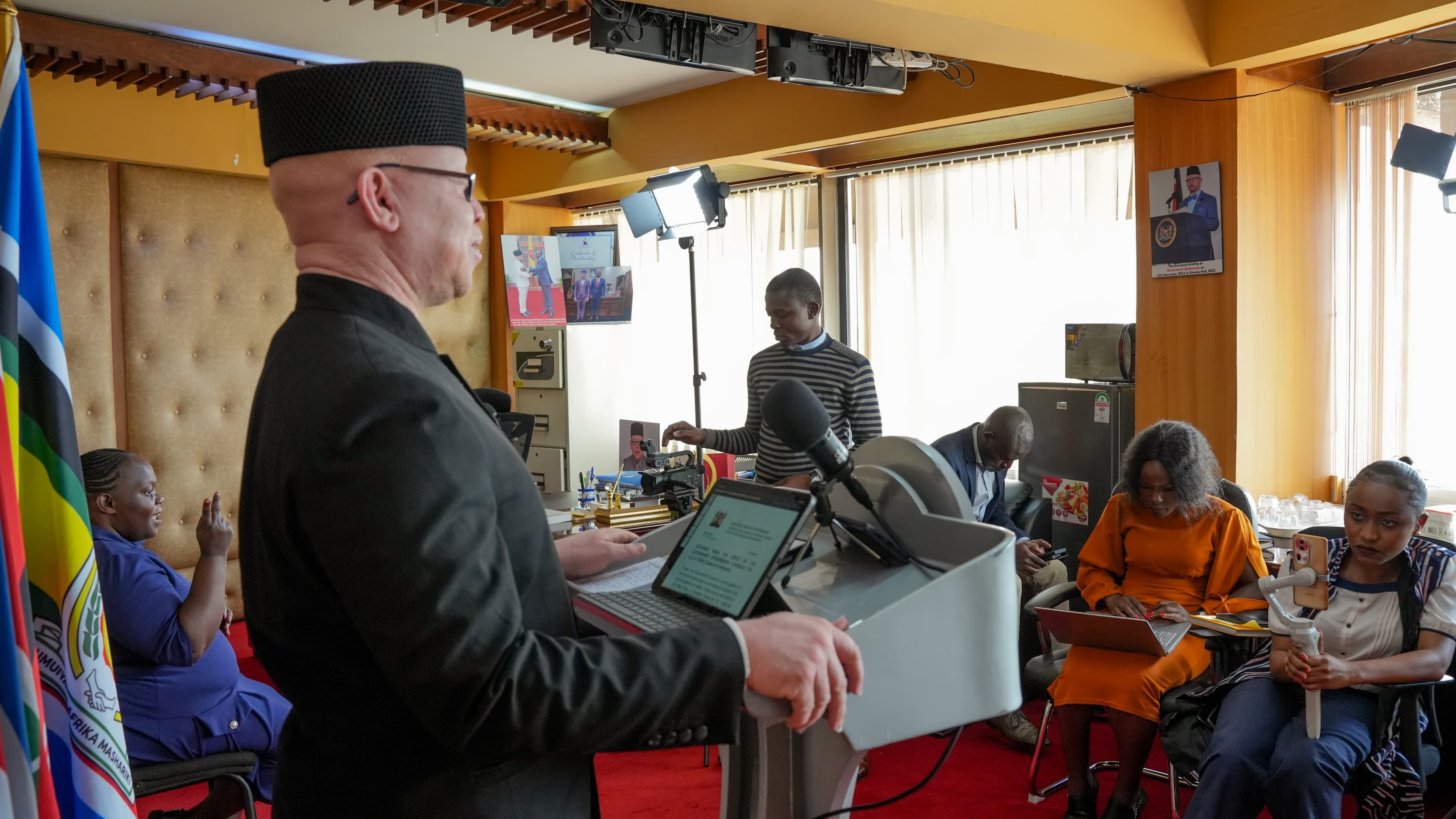
Why gambling advertisements & testimonials have been suspended
The ban is effective for 30 days starting April 29, 2025.
With as little as Sh100 and a quick tap, many Kenyans are sinking deeper into debt, despair and addiction.
In Summary
 Government Spokesperson Dr Issac Mwaura addresses the media on gambling and other matters of national importance at the KICC Tower. /Mathew Gwendo/OGS
Government Spokesperson Dr Issac Mwaura addresses the media on gambling and other matters of national importance at the KICC Tower. /Mathew Gwendo/OGS
At the heart of Kenya’s urban centres and villages, a new addiction is silently overturning lives.
Once passed as harmless fun, gambling has transformed into a national crisis, pulling in record numbers with promises of easy money and overnight success, prompting urgent government action to protect its youthful citizens.
Behind the glitzy adverts and celebrity endorsements, a dark truth emerges across the country as the mobile betting exploded into a multi-billion-shilling industry.
It is no longer a young person’s game, but with as little as Sh100 and a quick tap, many Kenyans are sinking deeper into debt, despair and addiction.
Primarily driven by mobile technologies, economists caution that betting firms structure odds to ensure most participants lose more than they win over time, with systems designed to favour the house.
In June 2024, Kenya Revenue Authority (KRA) collected Sh24.3 billion from gambling and betting firms, a notable rise from Sh19.2 billion collected in 2023.
Experts note that for many Kenyans, gambling has shifted from entertainment to dependency, with devastating effects and financial strain not being the only danger.
As the number of licensed betting firms continue to rise, the Betting Control and Licensing Board (BCLB) has intensified its regulatory measures.
The board has deployed real-time digital monitoring to track licensed and unlicensed operators.
They have also intensified audits, conducted surprise inspections, and revoked licenses for non-compliant firms.
The government aims to foster a safer and more responsible approach to gambling in the communities through these actions, says Government Spokesperson Dr Isaac Mwaura.
“In tandem with these efforts, the government is actively pushing for the Gambling Control Bill, 2023, currently at the Senate-National Assembly mediation stage” the Government Spokesperson adds.
The proposed law seeks to transform the gambling landscape by introducing stricter advertising rules, prohibiting youth-targeted promotions, mandating responsible gaming messages and restricting the time spent on gambling ads on TV and radio.
In a parallel move, the Communication Authority of Kenya (CA) have also ordered TV and radio stations to reduce betting, lottery and gambling content within 14 days or risk license revocation.
“The Authority will take enforcement action against a broadcaster who fails to remedy these contraventions in line with Section 83A (1) of the Kenya Information and Communications Act,1998; and/or revoke the licence as per Sections 46J(a) and (b) of the Kenya Information and Communications Act, 1998,” CA Director General David Mugonyi said.
Beyond financial ruin, gambling is leaving a quiet trail of devastation, from pawned possessions to auctioned land titles to educational expenses left unpaid.
The desperation to recover lost bets drives individuals into deeper cycles of debt, threatening not just financial stability but the well-being of entire families.
This situation brings about feelings of shame that can quickly give way to depression and mental health.
Experts warn that gambling is now a recognised driver of Kenya's alarming increase in suicide rates.
The deputy government spokesperson, Gabriel Muthuma, states that the youth of our nation are the trustees of posterity.
“We must protect them from the false allure of gambling and empower them with real opportunities in education, innovation, and enterprise. The government remains committed to creating an environment where ambition is nurtured, not gambled away,” said Muthuma.
The Principal Secretary, State Department for Public Health and Professional Standards, Mary Muthoni, added that her state department has formed a rapid response team to address gambling addiction.
The team has established a national helpline, 719, for affected individuals.
“We have deployed counsellors in schools and colleges, conducted targeted awareness campaigns on online gambling risks, and conducted a multi-agency national study to assess gambling addiction prevalence and impact upon our youth,” Muthoni affirmed.
She noted that the government has integrated gambling rehabilitation services into the Social Health Authority (SHA) packages to enhance support for individuals affected by gambling issues.
Further, a statement on gambling from the Ministry of Health, announced that as part of the Mental Health Awareness Month activities, themed "Community," the Ministry will scale up national efforts to promote mental wellness throughout May 2025.
The key highlight will be on the week of May 12 to 18, 2025, during which the Ministry will roll out targeted activities across counties that explicitly address gambling addiction.
However, while government action is critical, real change must also take root in homes, schools, places of worship and within individuals themselves.
Changing the course of the gambling crisis will require more than regulation, and it will demand a collective shift in values and responsibility.
Wanyoike is a Public Communication Officer at the Office of Office of the Government Spokesperson.

The ban is effective for 30 days starting April 29, 2025.